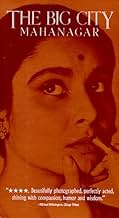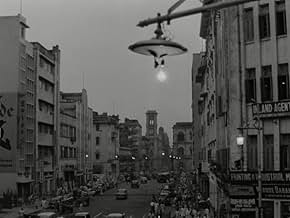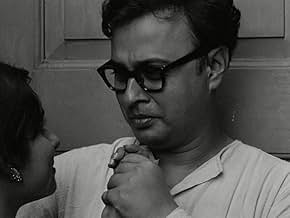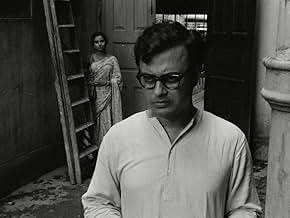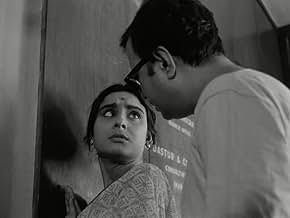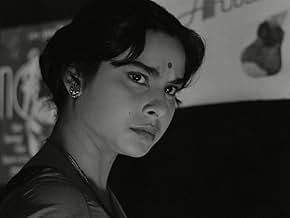IMDb RATING
8.3/10
5.3K
YOUR RATING
Life at home changes when a house-wife from a middle-class, conservative family in Calcutta gets a job as a saleswoman.Life at home changes when a house-wife from a middle-class, conservative family in Calcutta gets a job as a saleswoman.Life at home changes when a house-wife from a middle-class, conservative family in Calcutta gets a job as a saleswoman.
- Director
- Writers
- Stars
- Awards
- 4 wins & 1 nomination total
Madhavi Mukherjee
- Arati Mazumder
- (as Madhabi Mukherjee)
Jaya Bachchan
- Bani
- (as Jaya Bhaduri)
Sefalika Devi
- Sarojini (Subrata's Mother)
- (as Shephalika Devi)
Haradhan Bannerjee
- Himangshu Mukherjee
- (as Haradhan Banerjee)
- Director
- Writers
- All cast & crew
- Production, box office & more at IMDbPro
Featured reviews
I haven't watched much of Satyajit Ray's films, but now I strongly have an urge to watch more and more.. My first Ray film was Charulata, which was once screened in our college film club. It too had Madhabi Mukherjee playing the title character, 'The lonely wife'.
After having finished watching Mahanagar, I felt that the lonely house wife I had seen earlier had achieved a sense of fulfillment..a sense of completion.The entire film is a microcosm of an typical urbane family of the 1960's Calcutta. The legendary city of Calcutta in the 1960's has been impressionistic-ally captured with all its charm as well as confusion.We can see some of the best well-scripted, realistic emotional sequences. An young Jayabhaduri too appears as the little sister of Mr. Mazumdar(The main character's husband). Madhabi Mukherjee again dons a intense character and proves her brilliance in acting.Now I have become impatient enough to watch Ray's Calcutta Trilogy and other films too.It is very difficult to get good prints of most of them.
Ray had based this film on Abataranika, a Bengali short story. All the actors have been handpicked-especially Anil Chatterjee and Haren Chatterjee-who played the role of Mr. Mazumdar and his father.The film was well-received at the 14th Berlin Festival and Ray won a Silver Bear for direction. Even though it was rejected at the Oscars, it received an All India merit certificate at the National awards that year.
After having finished watching Mahanagar, I felt that the lonely house wife I had seen earlier had achieved a sense of fulfillment..a sense of completion.The entire film is a microcosm of an typical urbane family of the 1960's Calcutta. The legendary city of Calcutta in the 1960's has been impressionistic-ally captured with all its charm as well as confusion.We can see some of the best well-scripted, realistic emotional sequences. An young Jayabhaduri too appears as the little sister of Mr. Mazumdar(The main character's husband). Madhabi Mukherjee again dons a intense character and proves her brilliance in acting.Now I have become impatient enough to watch Ray's Calcutta Trilogy and other films too.It is very difficult to get good prints of most of them.
Ray had based this film on Abataranika, a Bengali short story. All the actors have been handpicked-especially Anil Chatterjee and Haren Chatterjee-who played the role of Mr. Mazumdar and his father.The film was well-received at the 14th Berlin Festival and Ray won a Silver Bear for direction. Even though it was rejected at the Oscars, it received an All India merit certificate at the National awards that year.
I found the movie exhilarating. This a movie where a Bengali housewife's actual stand in the eyes of those near to her comes to life. The house wife Aarati takes up the load of a job only to care for her family. While other family members gradually accept her new role, mostly because of the dire need of money, its her closest ally in the family, her husband, who isn't very warm to her new role. It first of all hurts his pride to accept her contribution, and he also resents her new found confidence, more than her independence. At the same time, Its the housewife Aarati who passes every test, as she copes with every challenge thrown at her, at home, at work and in her relationships with every individual. Personally i think thats what women are groomed to be, from birth, brave to take on the world whenever necessary. Its the husband who falters and learns to accept her after a big fight within himself.
Satyajit Ray, in Mahanagar, made a movie where ( in terms of cinematography and story-telling) not a single frame is wasted in anyway. Every movement of the actors, every hint relates to something or the other, while the story-telling is still simple enough for the ordinary to follow the story. I would recommend this to anyone.
Satyajit Ray, in Mahanagar, made a movie where ( in terms of cinematography and story-telling) not a single frame is wasted in anyway. Every movement of the actors, every hint relates to something or the other, while the story-telling is still simple enough for the ordinary to follow the story. I would recommend this to anyone.
Life at home changes when a house-wife from a middle-class, conservative family in Calcutta gets a job as a saleswoman.
According to Roger Ebert, "the power of this extraordinary film seems to come in equal parts from the serene narrative style of director Satyajit Ray and the sensitive performances of the cast members." He described Mahanagar as "one of the most rewarding screen experiences of our time".
Ebert, as usual, is spot on. This film was a stunning surprise for me. With very few exceptions, I have found the "great" Indian films to be a let down, and the modern Bollywood film is just unbearable. This was, however, a treat and a great exploration of culture. The idea of women working and how that affects the esteem of their husbands is not unique to India, but there are certain themes -- the reaction of her father-in-law! -- that are unlike what you might see in an American film.
According to Roger Ebert, "the power of this extraordinary film seems to come in equal parts from the serene narrative style of director Satyajit Ray and the sensitive performances of the cast members." He described Mahanagar as "one of the most rewarding screen experiences of our time".
Ebert, as usual, is spot on. This film was a stunning surprise for me. With very few exceptions, I have found the "great" Indian films to be a let down, and the modern Bollywood film is just unbearable. This was, however, a treat and a great exploration of culture. The idea of women working and how that affects the esteem of their husbands is not unique to India, but there are certain themes -- the reaction of her father-in-law! -- that are unlike what you might see in an American film.
Mahangar captures the middle class culture of post-independence Calcutta effectively. The movie shows the emotional crisis of a family caught between family tradition and increasing expenses. The husband-wife relationship starts unraveling under the stress of brand new corporate identity and financial comfort the wife discovers. Its interesting how the other family members come to terms and make peace with the changed dynamics when they see their own gratification with the higher salary. Ray has done an exceptional job in uplifting the role of the Indian wife and depicting an almost perfect superwoman character rising to the occasion and being the pillar of support at home and at work. Throughout these changes in lifestyle, she continues to rely upon her husband for moral support. The ending is well scripted in their current dire situation, the couple finds mutual confidence and solace to continue the struggle and dream.
I loved this film. Madhabi Mukherjee is gorgeous and so engaging, with the virtuosic ability to represent the stresses of a changing Calcutta through a simple glance. Mahanagar is a fascinating dramatic case study of the collision of modernism and traditionalism that produced a sociocultural duality/dichotomy in twentieth-century India's urban landscapes.
We see all sorts of manifestations of duality in Mahanagar. The tension-cum-rivalry of Arati and Subrata is, of course, the most obvious manifestation. However, we also have the duality of the new- generation Arati/Subrata and the old-generation Sarojini/Priyogopal (Subrata's mother and father) and Arati, who wears traditional clothing and speaks Bengali, versus Edith, the English-speaking Anglo-Indian in Western dress. These instances of duality speak directly to the moment in which things began to make a 180-degree shift in India, when women became the breadwinners of the household and traditional gender norms became subsumed by sexual liberation.
With a leading lady as precise as Mukherjee, Ray was able wrap these complex coterminous processes up in a relatively tidy package. Mahanagar is essential viewing.
We see all sorts of manifestations of duality in Mahanagar. The tension-cum-rivalry of Arati and Subrata is, of course, the most obvious manifestation. However, we also have the duality of the new- generation Arati/Subrata and the old-generation Sarojini/Priyogopal (Subrata's mother and father) and Arati, who wears traditional clothing and speaks Bengali, versus Edith, the English-speaking Anglo-Indian in Western dress. These instances of duality speak directly to the moment in which things began to make a 180-degree shift in India, when women became the breadwinners of the household and traditional gender norms became subsumed by sexual liberation.
With a leading lady as precise as Mukherjee, Ray was able wrap these complex coterminous processes up in a relatively tidy package. Mahanagar is essential viewing.
Did you know
- TriviaFifteen-year old Jaya Bhaduri's (later known as Jaya Bachchan) film debut and her only film with Satyajit Ray.
- GoofsWhen Priyogopal (Subrata's father) goes to visit his student Anupam Roychowdhury to ask for money he is shown having a conversation with Anupam in his office. When he is explaining his circumstance the camera shows him only sitting on a chair with his walking stick. In the very next scene when all the three characters are shown (third one being Anupam's wife ) the top of his walking stick has changed direction. The round bit on top was towards the right before and is turned to the left in the very next scene.
- Quotes
Arati: You wouldn't recognize me on the job.
Subrata Mazumdar: What about at home? Would I recognize you at home?
Arati: You don't recognize me? Tell me honestly.
[Subrata shakes his head no]
Arati: Why not?
Subrata Mazumdar: It all feels a bit unfamiliar. It feels a bit...
Arati: What about this?
[points at her cheek]
Arati: You don't recognize my mole? I'm still the same housewife.
- ConnectionsReferenced in Creative Artists of India: Satyajit Ray (1964)
- How long is The Big City?Powered by Alexa
Details
- Release date
- Country of origin
- Official site
- Languages
- Also known as
- The Big City
- Filming locations
- RN Mukherjee Rd, Calcutta, West Bengal, India(closing shot: view of the city)
- Production company
- See more company credits at IMDbPro
- Runtime2 hours 16 minutes
- Color
- Sound mix
- Aspect ratio
- 1.37 : 1
Contribute to this page
Suggest an edit or add missing content



